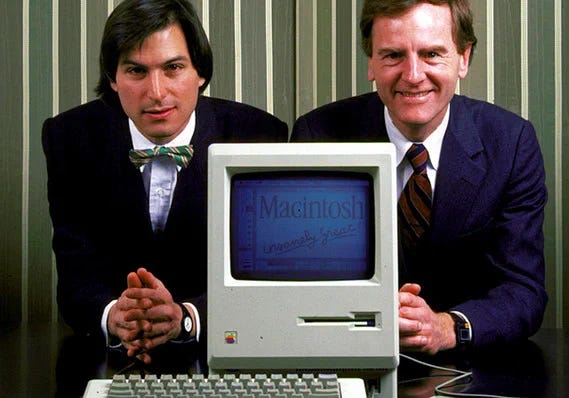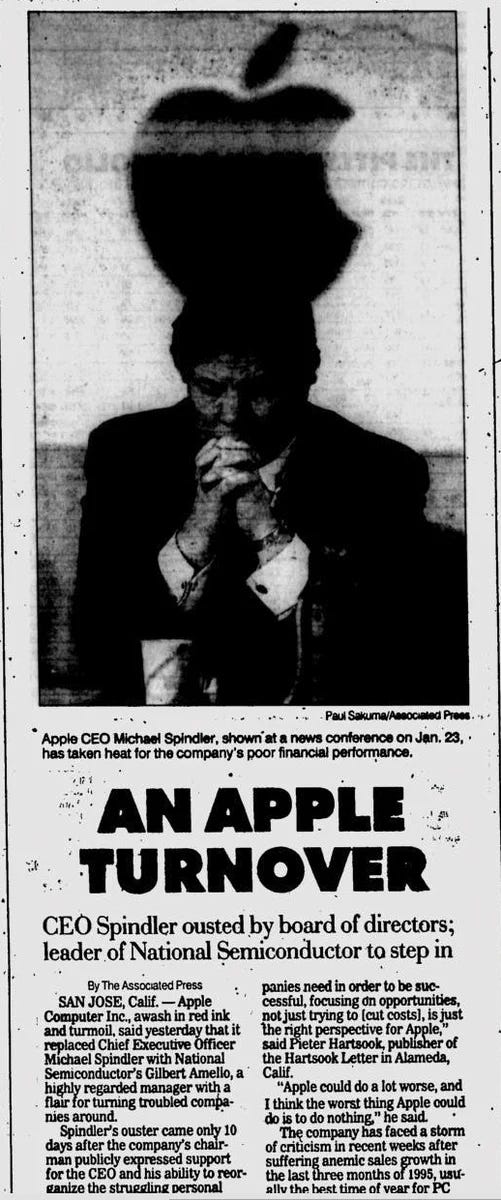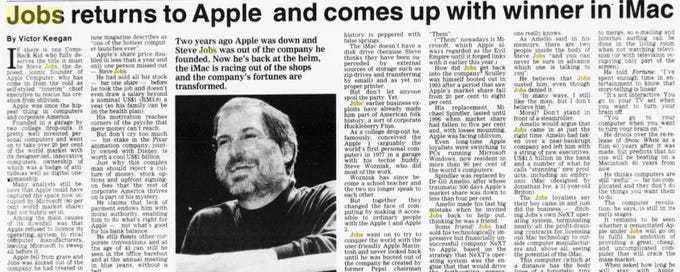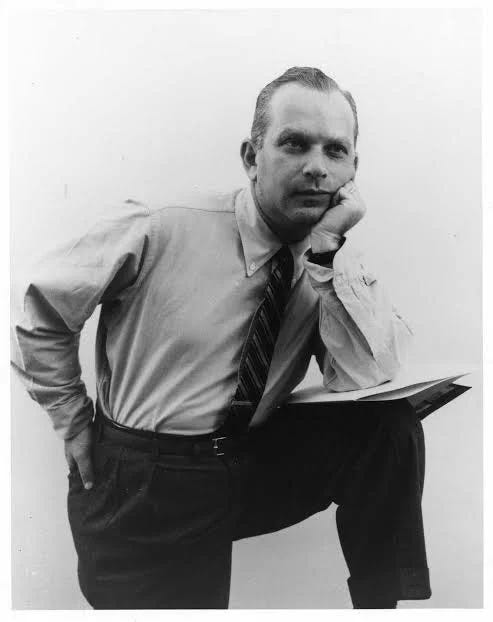What’s good young and eager mind?
Last essay of the week already!
Just brought Aliya-Mae to daycare for the first time :)
So that means that in a sea of tranquility, I gots time for you baby. So let us do a case study since that’s been a while.
Apple's such a wildly successful powerhouse that it's hard to forget that they almost went bankrupt... Twice.
"Apple was about 90 days away from being bankrupt back then. And it was much worse than I thought it was when I went back initially."
- Jobs at the D8 conference (2010):
After ousting Jobs in 1985, John Sculley (left) took over.
Things didn't go so well during Sculley's reign.
An already bleak financial situation worsened.
So Michael Spindler was brought in.
So in 1997, Apple's board invited Jobs back as an interim CEO.
However, Jobs' impact on Apple was so profound and transformative that he ended up staying as CEO permanently.
Jobs, in contrast to the other CEOs, was a craftsman. He was a carpenter, a blacksmith, a chef.
Sculley and Spindler had no vision.
This led to internal conflicts which affected Apple's ability to focus.
That made it hard to compete in a highly competitive environment (Microsoft, IBM, computer manufacturers).
Their products didn't resonate with consumers and the marketing during their era sucked.
Now contrast that with how Jony Ive (Apple's Senior VP of industrial design) talks about Jobs:
“Steve and I spent months and months working on a part of a product that, often, nobody would ever see, nor realize was there.
It didn’t make any difference functionally.
We did it because we cared.
Because when you realize how well you can make something, falling short, whether seen or not, feels like failure."
Lesson
If you're too business-driven this might seem like wasted effort.
But it's not.
It signals something to yourself, to your employees, and to your customers when they inevitably find out.
When I teach the 4Ps of marketing, I always list them as pairs in the same order:
Product & Price; Place & Promotion
Most non-trained marketers equate marketing to distribution. Marketing = advertising, they say.
It's everything you do ONCE the product has been made in complete isolation, by the tech team.
But this couldn't be further from the truth. Product is the very first P.
That matters because, to quote the advertising Godfather, Bill Bernbach:
"Advertising can't make a bad product good, but it can make a good product fail faster."
"This sounds really simplistic but it still shocks me how few people actually practice this," Ive says.
"And it's this issue of focus."
The bain of every teacher of marketing/entrepreneurship's existence is people dismissively claiming that because they already heard something, they know that something.
That's a HUGE problem because, if you listen to all your favorite GOATs, they'll all tell you how important the fundamentals are.
"Steve was the most remarkably focused person I've ever met in my life.
And the thing with focus is that it's not something you inspire to and you decide on Monday 'You know what, I'm gonna be focused.'
It is an every minute, a 'Why are we talking about this? This is what we're working on!'
You can achieve so much when you truly focus.
And one of the things Steve would say, because he was concerned that I wasn't, is 'How many things have you said no to?'
And I would have these sacrificial things.
But he knew I wasn't vaguely interested in doing those things anyways.
So there was no real sacrifice.
What focus means is saying no to something that, with every bone in your body you think is a phenomenal idea, and you wake up thinking about it, but you say no to it, cuz you're focussing on something else."
The end of this clip also touches on the notorious assholery of Jobs.
With Ive asking if he couldn't be a bit nicer.
And Jobs telling him that he [Ive] is more concerned with how he is perceived instead of holding the work up as the most important thing.
I've asked a few Professors I admire for their thoughts on this and one of the best answers boiled down to: enrollment.
If people sign up for that treatment, everyone's on the same page and then it can work
See Michael Jordan for example:
But you also run the risk of making the team perform even more poorly.
Especially if they don't understand how much you care about the product, or that you're trying to make them better, but instead think you simply hate them.
Go have a fantastic weekend and I’ll see you Monday.
Chop wood. Carry water.
RJY










what I've learned from this article.
The name of RJ's daughter :)